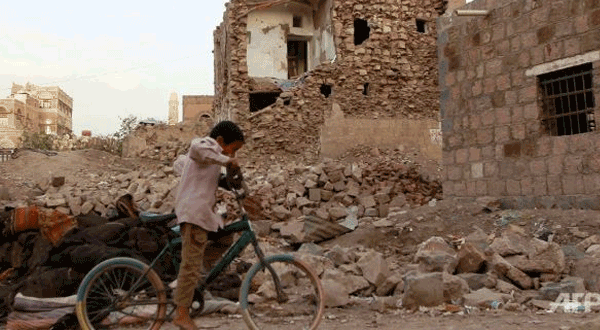KUWAIT CITY: A third day of UN-brokered peace negotiations in Kuwait between the Yemeni government and rebels wound up Saturday without progress, sources close to the talks said.
The sources told AFP the two sides remained far apart, especially on the need to firm up a fragile ceasefire that went into effect on April 11.
UN envoy Ismail Ould Cheikh Ahmed said in a statement late Saturday the talks had achieved “common ground to build on” but acknowledged that the negotiations were difficult.
“The atmosphere of the talks is promising and there is common ground to build on in order to reconcile differences,” he said.
“We must realise that these difficult negotiations require time because they aim at reaching a solid agreement on a package of contentious issues so that the solution would be comprehensive and hollistic,” Ould Cheikh Ahmed said.
He added that the delegates agreed to the proposed agenda and to “work in parallel committees on political and security issues”.
A senior government delegate, however, denied that his delegation agreed to form parallel committees.
“Our delegation has not agreed to form the parallel committees as stated in the UN communique,” the delegate told AFP, requesting anonymity.
Ould Cheikh Ahmed also said the two parties reaffirmed their committment to ceasefire and agreed that it is “comprehensive and binding”.
He said on Friday the truce was still only being 70-80 percent respected, he acknowledged, adding there were violations by both sides.
The negotiations in Kuwait opened late Thursday after the delayed arrival of representatives of the Huthi rebels and allied forces loyal to ousted president Ali Abdullah Saleh.
The Iran-backed Shiite Huthi rebels have insisted on a halt to air strikes by the Saudi-led coalition which is supporting the government, ahead of other issues, the sources said.
President Abedrabbo Mansour Hadi’s delegation, for its part, is demanding the rebels lift sieges of cities, especially Taez, and release prisoners as part of confidence-building measures, the sources said.
The government delegation has submitted a complaint listing 260 alleged ceasefire violations by the rebels on Friday alone, according to the sources.
Rebel delegation spokesman Mohamed Abdulsalam said the priority was to end the fighting that has killed more than 6,800 people and driven 2.8 million from their homes since March last year.
“Stopping the war and all forms of military action is the priority,” he said on Facebook.
On Saturday, three rebels and two loyalists were killed in clashes in Kirsh, a town on the highway to Taez from the southern port city of Aden where Hadi’s government is based, military sources said.
Loyalist forces in Taez, Yemen’s third largest city, have been under rebel siege for months. On another battlefront not covered by the ceasefire, pro-Hadi forces backed by air power from the Arab coalition launched an operation Saturday to drive Al-Qaeda fighters out of a southern provincial capital, Yemeni military officials said.
The forces in Abyan province advanced towards Zinjibar and the neighbouring town of Jaar, the sources said.
Military and medical sources said 25 Al-Qaeda militants and four soldiers were killed. Troops also reached the government complex on the southern edge of Zinjibar and fighting raged around the compound, military officials said.
Government forces last week expelled Al-Qaeda militants from Huta, the capital of Lahj province, as part of operations to secure southern provinces.–APP





